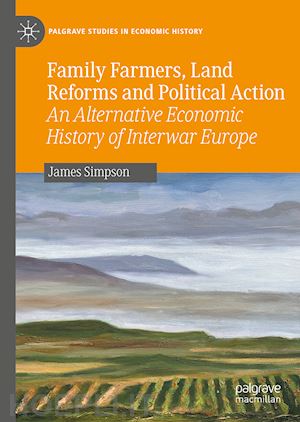
Questo prodotto usufruisce delle SPEDIZIONI GRATIS
selezionando l'opzione Corriere Veloce in fase di ordine.
Pagabile anche con Carta della cultura giovani e del merito, 18App Bonus Cultura e Carta del Docente
This book examines how European farmers responded to the economic and political challenges created by the First World War and the Great Depression. The difficulties of interwar Europe have been frequently explored, but rarely from the perspective of the agricultural sector, where two-fifths of the population earned their livelihood, mostly as small, family farmers.
The traditional literature argues that the landed elites conspired to undermine many of Europe's young democracies after the Great War. This book shows instead that by the early 1920s most had either sold their land or seen it confiscated following the widespread land reforms of Eastern Europe, leaving the family farm as the dominant unit of production. The book advances several theories that place the family farmer at the heart of change and explores why some proved to be enthusiastic supporters of liberal democracy, while others preferred political ideologies as diverse as social democracy in Scandinavia or fascism in Germany and Italy. It explores the nuanced and evolving links between family farms and government interests, showing how this relationship varied in different countries and contexts across Western and Central Europe. The book discusses the impact of family farms on agricultural market trends, the influence of collective action on government policies, and the increasing politicization of farmers and rural populations more broadly. The book also sheds light on how agrarian problems and their solutions differed in industrial, agrarian, and transforming societies in interwar Europe. This book will be an illuminating read for scholars of economic history, comparative history and European history interested in agriculture and rural communities.
Introduction.- Chapter 1. Agriculture and the Pursuit of Economic Growth.- Chapter 2. Farmers and the Dynamics of Agricultural Change in Interwar Europe.- Chapter 3. Agriculture and the State.- Chapter 4. When did the Landed Elites Give up Power? A European Perspective.- Chapter 5. Land Reform and Farming in Interwar Europe- Chapter 6. Family Farmers: from Cooperatives and Voluntary Associations to Political Parties.- Chapter 7. Farm Labourers.- Chapter 8. The Great Depression.- Chapter 9. Farmers and Politics in Interwar Europe.- Chapter 10. Conclusions.
James Simpson is Emeritus Professor of Economic History at Universidad Carlos III de Madrid, Spain. He has published extensively in economic history, Spanish economic history, agricultural history, the history of the wine industry, and economic development in Spain and Europe.











Il sito utilizza cookie ed altri strumenti di tracciamento che raccolgono informazioni dal dispositivo dell’utente. Oltre ai cookie tecnici ed analitici aggregati, strettamente necessari per il funzionamento di questo sito web, previo consenso dell’utente possono essere installati cookie di profilazione e marketing e cookie dei social media. Cliccando su “Accetto tutti i cookie” saranno attivate tutte le categorie di cookie. Per accettare solo deterninate categorie di cookie, cliccare invece su “Impostazioni cookie”. Chiudendo il banner o continuando a navigare saranno installati solo cookie tecnici. Per maggiori dettagli, consultare la Cookie Policy.